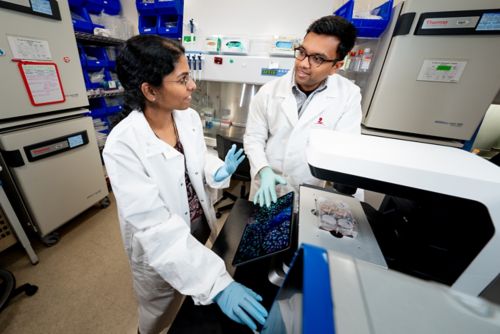St. Jude Family of Websites
Explore our cutting edge research, world-class patient care, career opportunities and more.
St. Jude Children's Research Hospital Home

- Fundraising
St. Jude Family of Websites
Explore our cutting edge research, world-class patient care, career opportunities and more.
St. Jude Children's Research Hospital Home

- Fundraising
Senthil Bhoopalan Lab
Understanding and treating bone marrow failure disorders
About the Bhoopalan lab
Every day, an average healthy adult human generates 100 billion white blood cells, 200 billion red blood cells and 100 billion platelets! It is even more remarkable that only about 10,000 to 20,000 hematopoietic stem cells support this massive undertaking for the entirety of human life. Diseases associated with the failure of this intricately regulated process are called bone marrow failure disorders. Our lab studies the mechanisms underlying such diseases. Using cutting-edge techniques, we aim to transform how we treat bone marrow failure diseases and pave the way for more targeted and transformative therapies."
Our research summary

The overarching objective within the Bhoopalan Lab is to advance our understanding of the mechanisms underlying hematopoietic failure in inherited bone marrow failure disorders. Among such inherited disorders is DBA, which is usually caused by heterozygous loss-of-function mutations in one of 24 ribosomal protein genes, with RPS19 mutations accounting for 25% of cases. A lack of patient bone marrow cells is a significant limitation in studying these rare disorders. We use genome editing tools, such as CRISPR and base editing, to model these mutations in CD34+ hematopoietic stem/progenitor cells and utilize cutting-edge techniques, such as single-cell RNA-Seq, single-cell whole genome sequencing, CUT&RUN and multi-omics to understand mechanisms driving hematopoietic failure in these catastrophic diseases of childhood.
Using these insights, we strive to develop novel therapies for patients with these disorders. Our group has developed a lentiviral vector encoding RPS19, which we are currently advancing toward clinical use for certain eligible patients with DBA. However, there are several other rarer forms of DBA and other rarer bone marrow failure disorders that are dosage-sensitive or cell type-specific, which precludes the use of lentiviral vector gene therapy; these mutations require a more targeted approach. Through the St. Jude blue-sky initiative, PARADIGM, we are developing approaches that use base editors and prime editors to address these unique mutations in patients.
Publications
Contact us
Senthil Bhoopalan, MBBS, PhD
Department of Bone Marrow & Cellular Therapy
St. Jude Children’s Research Hospital

Memphis, TN, 38105-3678 USA GET DIRECTIONS